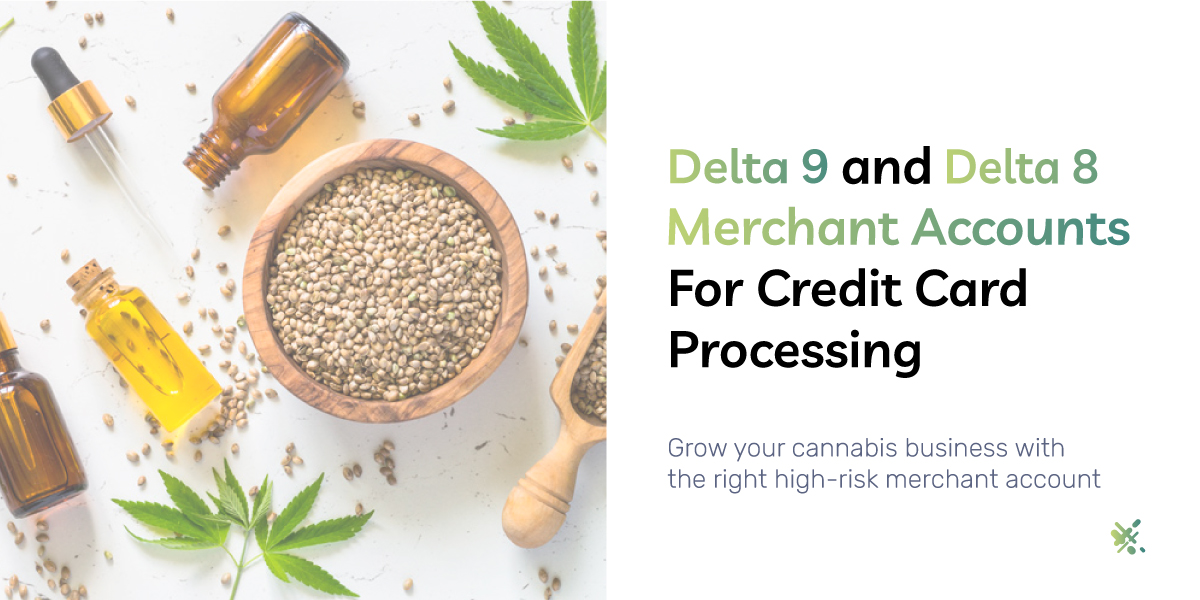Are you considering a Delta 9 or Delta 8 merchant account for credit card processing? If so, this article should provide some helpful insight into the newly booming industry and how to obtain the right merchant account with the best Delta 8 payment processor for your business.
As new as it is, Delta 8 THC is gaining mass popularity among cannabis consumers.
As a result, merchants are looking for ways to capitalize on the craze. However, selling these products isn’t as simple as selling a bottle of lotion or a set of essential oils. Though many cannabis products are now legalized federally, they are still heavily regulated state by state.
Because of this, credit card payment processors and acquiring banks are required to abide by these regulations. Which can make acquiring a merchant account for Delta 8 credit card processing a bit of a challenge. But it doesn’t necessarily have to.
Follow along as we break down Delta 8 and Delta 9 and what it means for merchants who will need access to high-risk payment processing.
What is Delta 8 THC?
Delta 8 THC is a naturally occurring cannabinoid found in small percentages in most strains of the cannabis sativa plant. Because it is so minuscule, it is manufactured from hemp-derived cannabidiol (CBD) in concentrated amounts.
Many believe Delta 8 is a new cannabis product. However, delta 8 THC was actually first discovered in 1941 by chemist Roger Adams and fully synthesized in the 1960s. Delta 8’s full research and production had to come to a halt, however, due to the Controlled Substances Act in 1970. Which ruled the substance as federally illegal.
However, in other parts of the world, Israel to be exact, where the confines of the CSA of 1970 did not exist, chemist Raphael Mechoulam found that hemp-derived, non-psychoactive CBD could be converted into delta 8 THC.
Then come 2018, under the 2018 Farm Bill, passed by President Donald J. Trump, hemp was proclaimed as federally legal. And because delta-8 is derived from hemp cannabis, it also was no longer outlawed. Certain states, however, have their individual regulations surrounding all cannabis-based products.
While CBD products do not have any psychoactive properties, delta 8 THC from the same source does have psychoactive properties. Such properties are similar to the psychotropic delta 9 THC, yet typically less potent. Similar to delta 9, larger quantities of delta 8 can induce relaxation, focus, pain reduction, sedative effects, and more.
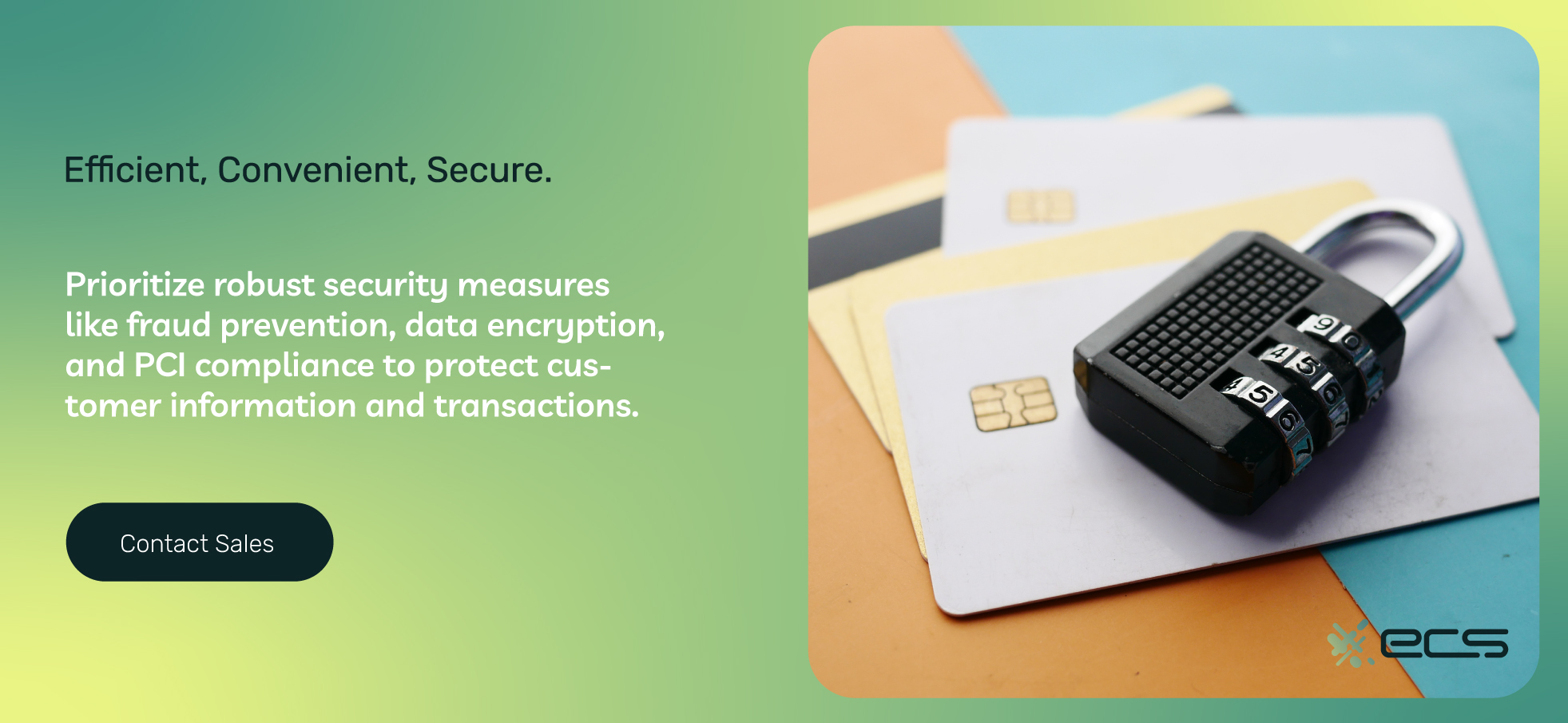
What is Delta 9 THC?
Delta 9 tetrahydrocannabinol (THC), founded by the same Israeli chemist, Raphael Mechoulam, also endearingly referred to as “the father of cannabis”, is another one of the naturally occurring cannabinoids found in the cannabis sativa plant. In fact, there are over 100 cannabinoids within the cannabis plant.
Delta 9’s name comes from the 9 THC molecules in the substance’s molecular structure. Unlike delta 8 which is found in trace amounts within the cannabis plant, delta 9 is found at large, in significant amounts.
Conversely, to CBD from hemp cannabis, delta 9 contains THC, which makes it a psychotropic. Which means it has mind-altering effects that cause a user to feel “high.” This psychotropic is more potent than its delta-8 counterpart.
With that being said, delta 9 products have been marketed as a beneficial substance that can aid users with many chronic health conditions. However, the FDA has not approved Delta 9 for medical use or safe use in general. It has, however, approved in some cases, dronabinol and nabilone- two synthetic formulations of THC to alleviate chemotherapy-induced side effects. But who wouldn’t argue that the natural substance should be approved of over synthetics, right?
Unfortunately, though, delta 9 is heavily regulated and in many cases illegal. For many reasons, one being that the risks may, in some cases, outweigh the benefits. But we will get into those in detail a little later on.
Regardless, in legal states, delta 9 vendors need to find a suitable high-risk marijuana merchant account to sell their products. Otherwise, the only way they’ll be dealing with customers is with cash. And we know that solution poses a threat to losing out on card-paying customers.
Delta 8 and Delta 9 THC Products
In the United States, Delta 9 is not federally legal. However, in the states where it is, cannabis merchants can sell delta 8 and delta 9 THC products in numerous forms, including but not limited to:
- Beverages
- Baked goods
- Buds
- Candies
- Capsules
- Cartridges
- Concentrates
- Dabs
- Distillate
- Edibles
- Extracts
- Flowers
- Gummies
- Moon rocks
- Oils
- Pre-rolls
- Shatter
- Sours
- Sublingual
- Syringes
- Tabs
- Taffy
- Tinctures
- Topical lotions
- Vapes
- Vape cartridges
- Vape pens
- Vape juices
- Wax
Is Cannabis Healthy?
The naturally-occurring cannabinoids of CBD, delta 8, and Delta 9 have been researched and found to carry some health benefits. However, general synopsis of any cannabis product cannot accurately describe it for everyone. There are numerous factors to consider to determine whether any product is good, bad, or if it varies case by case.
To understand the potential benefits and the potential risks of delta 8 or delta 9, one must consider:
- All product compounds and ingredients being consumed
- The dosage
- Consumption frequency
- Administration method
- The production quality (cultivation, extraction, and formulation)
- The health status of the user
- The demographic of the user

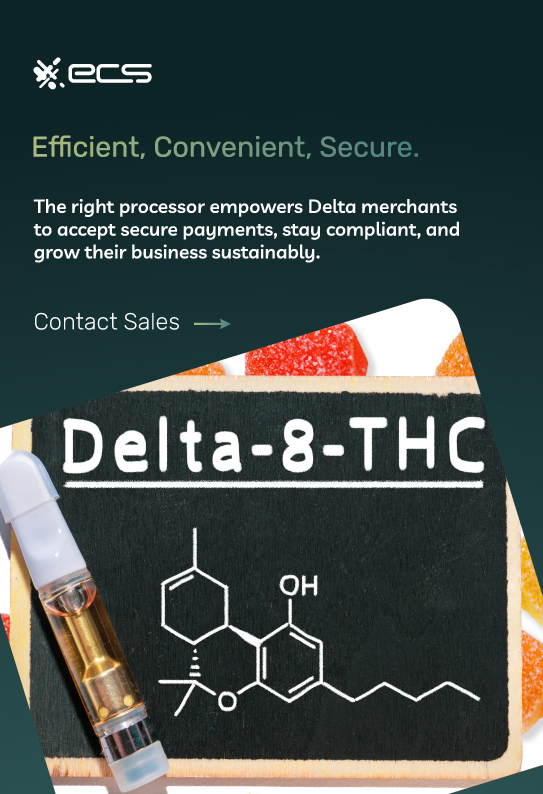
Delta 8 and Delta 9 THC Potential Benefits
With that in mind, cannabis products have shown vast improvement as therapeutic remedies for people who suffer from autoimmune diseases/disorders, autism, anxiety, depression, neurodegenerative disorders, post-traumatic stress disorder (PTSD), seizures, cancer, and more.
The potential benefits of delta 8 THC and delta 9 THC may include, but are not limited to:
- Anti-anxiety
- Anti-nausea
- Anti-spasticity from multiple sclerosis (MS)
- Exhilaration or feelings of happiness
- Heightened imagination
- Improved sensory perception
- Pain relief
- Stress-relief
- Improved sleep
- Improved appetite
- Pain relief
- Reduced inflammation
- Relaxation
Delta 8 and Delta 9 THC Potential Risks
Yes, delta 8 and Delta 9 have provided evidence of health benefits, therapy treatments for temporary and chronic disorders, and in some cases, medical necessity. However, like any good thing, there are also, typically, risks involved. These potential risks of delta 8 and delta 9 THC may include, but are not limited to:
- Altered sense of time
- Anxiety
- Confusion
- Difficulty concentrating
- Disorientation
- Dry mouth and eyes
- Dysphoria
- Hallucinations
- Headache
- Hypotension
- Impaired coordination
- Increased heart rate
- Lethargy
- Short-term memory loss
These adverse effects are typically short-term and will resolve within a few hours. However, research has linked longtime users with certain long-term negative cannabis effects.
These long-term risks can include, but are not limited to:
- Abdominal pain
- Anxiety
- Cancer
- Cardiac problems
- Dehydration
- Depression
- Infertility
- Liver damage
- Memory/processing problems
- Paranoia
- Psychosis
- Recurring nausea
- Toxicity from chemicals in the manufacturing process
- Schizophrenia
- Severe vomiting
- Substance abuse disorders
Keep in mind these risks have a higher chance of affecting individuals that have preexisting conditions that others do not have. Additionally, it is important to note that the FDA has not evaluated nor approved any of the Delta 8 and Delta 9 THC products for safe usage. Consulting a doctor is the most appropriate way to weigh the benefits vs the risks of any CBD, delta, or any other cannabis product.
The Difference Between CBD, Delta 8 THC, and Delta 9 THC
The cannabis plant offers various health benefits that consumers are looking for. But some of these benefits are tied to psychoactive side effects. Psychotropics might be the right market for some shoppers- for recreational use. But other consumers want to take advantage of the naturally occurring health benefits that cannabis offers without the “high”.
Fortunately, there are a number of extraction methods that create a variety of products from the cannabis plant, each with a distinct set of properties. Luckily people with different preferences are fortunate to have the option to choose between them. CBD has no THC and offers consumers health benefits with zero psychoactive effects. Meanwhile, delta 8 offers health benefits along with traces of THC, for a smaller psychoactive result.
And finally, delta 9 may carry the same benefits as CBD and delta 8, but with high levels of THC. And therefore, a more intense psychoactive effect. Keep in mind, though these products have some health benefits, they can also carry risks as well. And the effect of both the risks and benefits will vary based on the individual.
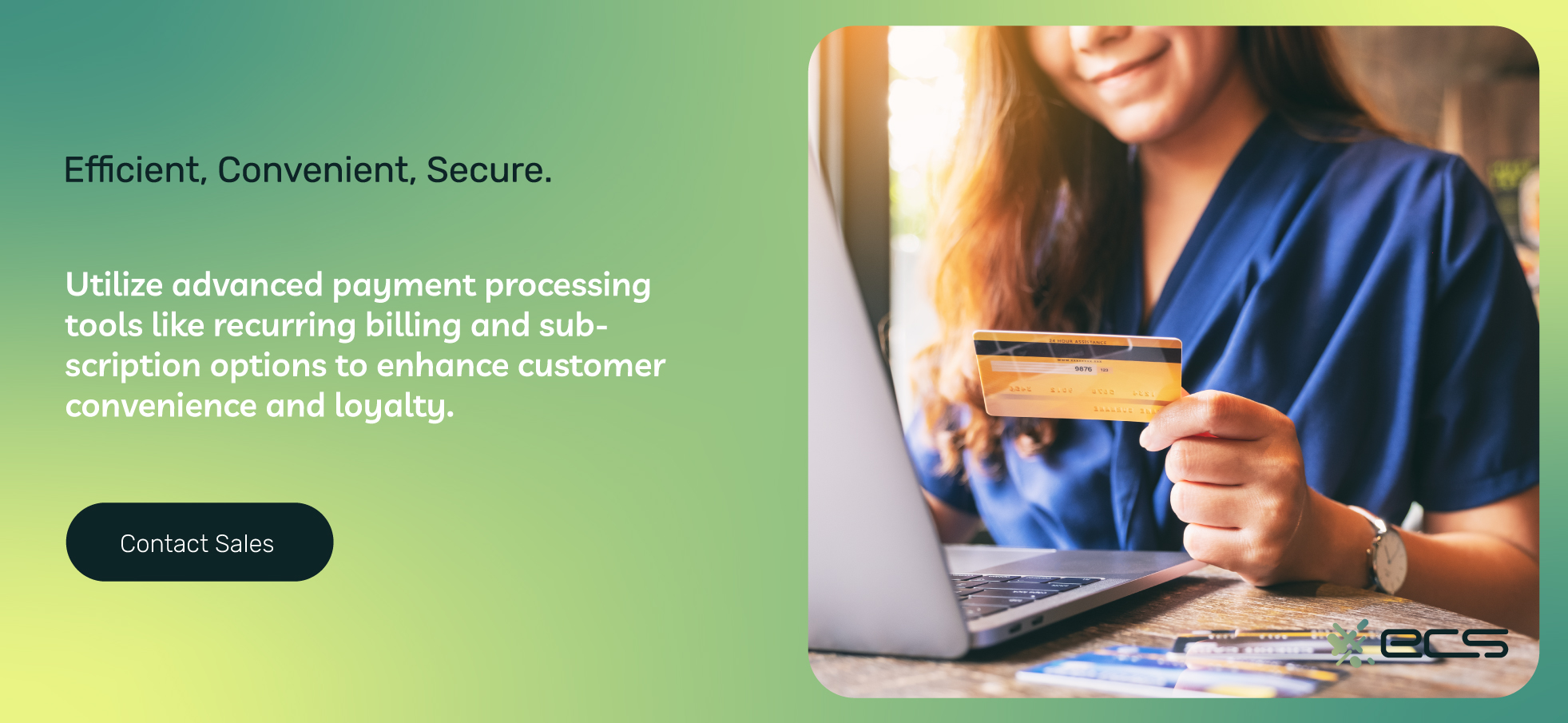
Delta 9 and Delta 8 Merchant Accounts For Credit Card Processing
Researchers are continually uncovering new compounds and thus, uses that can be derived from the cannabis plant. With more and more discoveries of the plant’s offerings, business owners have more financial opportunities to take advantage of. Introducing new and trending cannabinoid products to a CBD business could vastly increase sales and profit margins with a wider client reach.
However, introducing new products to inventory isn’t as easy as it seems. Not only would a CBD merchant have to follow strict state-by-state regulations for all cannabis products, they would also have to acquire a high-risk payment processor that would accept digital cannabis payments- credit, debit, or ACH.
Is it possible to sell CBD, delta 8, and Delta 9 without accepting digital payments? Yes, a merchant can always take cash or check. But that is never a good look. And it will surely drive paying customers away. Especially when their go-to method of payment is not accepted.
Because of this, merchants should always accept credit cards. No matter what they sell or even where they sell it. It offers more convenience to their customers and not to mention greater profits for their business. The only obstacle is finding the right high-risk Delta 8 or delta 9 payment processor for you.
What is a High-Risk Merchant Account?
A high-risk merchant is one that poses a threat to a bank or payment processor. The risk associated with this type of merchant is how likely the merchant is to assume excessive chargebacks from customer transactions.
A chargeback is when a cardholder informs their bank of a purchase that they do not agree with. This could be for reasons such as fraud, unauthorized purchase, incorrect amount, unsatisfactory product, product never received, double charged, paid by other means, and more.
Banks will forcibly debit the merchant account for the disputed transaction amount and this will create a case to be either refuted by the merchant or denied rebuttal. In this case, the cardholder would win the dispute.
If the merchant did decide to (or is allowed to, per their payment processor) fight the chargeback and win, with sufficient evidence, they would receive the funds credited back into their merchant account. Either way, the ultimate decision of the case winner comes from the cardholder’s bank.
Because the bank has to facilitate this lengthy and oftentimes unnecessary battle, they have to charge fees to cover their time and service. Because of these fees, high-risk merchant accounts tend to be more costly to merchants, with higher fees than a standard low-risk account.
Why Are Cannabis and Delta 8 Merchants Considered High Risk?
The sale of any cannabis products, such as CBD, delta 8 THC, and delta 9 THC automatically carries a high risk to payment processors. But why is this? Let’s take a look.
The legality concerning all cannabis products is complex. Regulations are convoluted and they vary from state to state. As a result, only certain acquiring banks offer processing benefits for merchants in this industry.
Because of this, it’s extremely important that merchants do all their research on the laws and regulations surrounding their inventory. Both federally and per the state their business is in and sells to. The more prepared and compliant a cannabis business is, the better its chances are at securing a high-risk merchant account.
As I mentioned above, high-risk means the merchant has a higher chance of acquiring chargebacks. So why would a cannabis merchant have a high risk for chargebacks compared to other merchant types? Let’s take a look at some examples:
- The merchant is falsely advertising product benefits
- A customer had a bad reaction to the product
- A customer did not like the product
- A customer experienced different results than the product claimed
- A customer does not recognize the merchant name on their bank statement
- A customer did not receive their product
- A customer regrets making the purchase
- A customer claims the charge was fraudulent or unauthorized
- The client base in the cannabis industry may be considered risky in general
Delta 8 THC, Delta 9 THC, and High-Risk Payment Processing
Now, let’s make one thing clear. Just because all cannabis-based products are considered high-risk, does not mean that all high-risk payment processors are able to accept and provide a high-risk payment gateway to any and all cannabis merchants.
For example, because CBD is non-psychoactive, it is usually more commonly accepted among most high-risk payment processors. However, the same does not go for delta 8 and delta 9. Because these two cannabinoids carry varying levels of THC, it is more difficult to find a payment processor that works with these specific products.
The reason is, the payment processor has to have approval from their sponsoring bank to approve merchants for accounts with these product types. And not all payment processors have that approval or that bank relationship. In fact, most traditional payment processors and banks choose to be uninvolved with the complicated and highly regulated world of cannabis at all. In most cases, however, a high-risk payment processor typically accepts CBD and Delta 8, whereas Delta 9 credit card processing can be harder to come by.
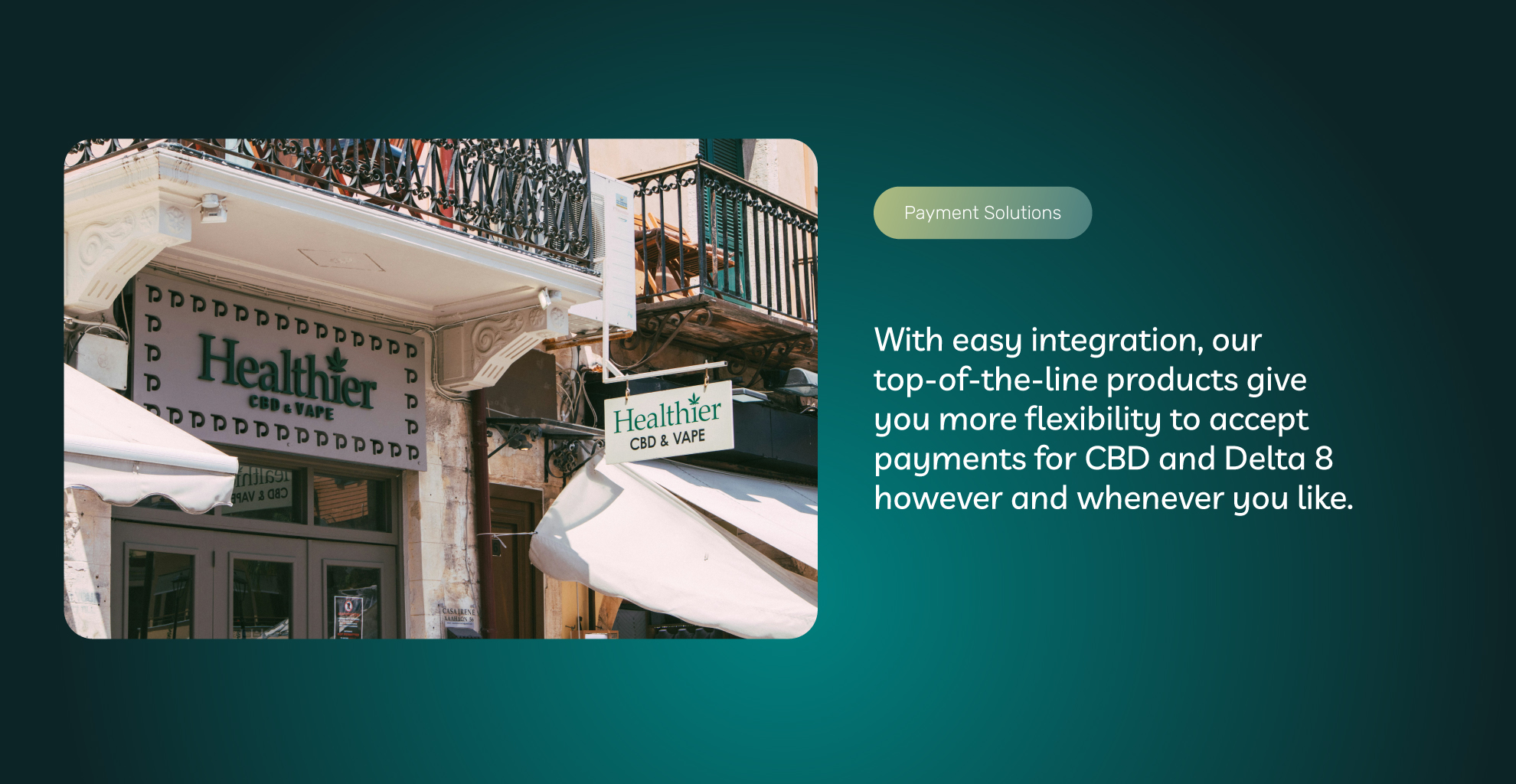
High-Risk Delta 8 Accounts With ECS
Fortunately, ECS Payments is a high-risk payment processor that works with all types of cannabis vendors. Including CBD and Delta 8 vendors. We offer world-class merchant services and innovative payment solutions to meet your unique business needs.
Our payment processing services offer fraud protection to secure your account and your cardholder’s data. With easy integration, our top-of-the-line products give you more flexibility to accept payment for CBD and Delta 8 however and whenever you like.
ECS’s services and solutions include:
- Credit card processing
- Debit card processing
- ACH processing
- Mobile apps
- Payment terminals
- Contactless payment
- Mobile payment
- Virtual payment gateways
- Seamless API integration
- Secure payment gateway
- Exclusive reporting portal
- Chargeback dispute assistance
- Fraud prevention
- Competitive merchant rates
- Customizable plans
- In-house risk team
- In-house merchant support
- In-house technical support
- Extended hours of operation for support
- emails and phone calls
Conclusion
The cannabis world is constantly changing. Laws and regulations are adapting with time. Research continues to make new discoveries on products, benefits, and risks. Consumers are becoming more curious. Merchants are trying to take advantage of the craze. And thus, the payment processing world is learning to adapt to it all.
While some banks are immovable on their policies, others are opening the door to digital payment opportunities for the sale of CBD, delta 8, and Delta 9 products. As a merchant, the best thing you can do for the growth of profit margins in your business is to look for a high-risk Delta 8 merchant account with a payment processor that can take on your Delta 8 product sales and offer digital payment processing services online and in-person for all your customers to buy delta 8, delta 9, and CBD products.
To contact sales, click HERE. And to learn more about ECS Delta Merchant Accounts visit High-Risk.
